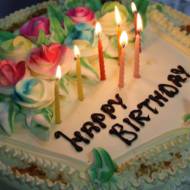Your cart is currently empty!

Rosh Hashana: Happy Birthday, World!

Rosh Hashana: Happy Birthday, World!

What does the birth of the world have to do with the day of judgment?
By Rabbi Ari Enkin, Rabbinic Director, United with Israel
“Today is the birth of the world,” says the famous Rosh Hashana prayer; “Today all creation stands in judgment.”
What does the world’s birth have to do with judgment?
Judgment is a difficult, painful process. So is birth. By being judged on Rosh Hashana, we have the ability to be born anew.
We are given a fresh new start. But we can only reach that milestone if we go through the difficult process of judgment first.
Often the most difficult part of childbirth, and the first part of the baby to enter the world, is the head – just as Rosh Hashana literally means the “head” of the year.
Once the head is out, the rest of the body usually follows with relative ease.
During the Hebrew month of Elul, we suffered the contractions leading up to the birth of this new year, which occurs on the first day of Tishrei.
Changing our ways is not easy. But we know we must go through hard labor if we want to be reborn.
Opening our hearts to recognizing our faults is the first step. Apathy is a much easier path to take – waking up to realize how far I am from my potential is emotionally painful.
Yet we know that self-realization can lead to something great.
Midwives will tell you that a woman who tries to fight her contractions or tenses up in fear will slow down the birth process. Usually, they encourage women to walk around and keep moving rather than to sit or lie down. During Elul, we needed to keep moving spiritually, despite the instinct to do otherwise.
Then comes the “transition phase.” Right before the final stage of labor, the mother may feel a slowing down in contractions. Her body is preparing for the final stage. Similarly, the shofar (ram’s horn) is blown every day of the month of Elul except for the day before Rosh Hashana – our transition phase into the High Holidays. We, too, are preparing for the birth of the world, and for our own rebirth.
On Rosh Hashana itself, we arrive at the birth. The shofar blows, echoing the cries of a woman in labor. It’s no coincidence that the Torah readings of this holy day revolve around conception and childbirth. The narratives of Sarah, Rachel, and Chana – three women who were barren and then conceived – are the stories chosen to be read aloud at synagogue on Rosh Hashana.
The shape of the shofar, too, reflects this theme. “From the straits I called upon G-d; G-d responded with expansiveness” is the first verse read before blowing the shofar. Narrow on one side and wide on the other, the act of blowing the shofar symbolizes the move from narrow straits to expansiveness, just as a baby being born must first pass through the narrow birth canal before entering the expansive world.
No wonder Kabbalists point to the time of shofar blowing as the moment of judgment on Rosh Hashana.
The rabbis teach that there are three processes that take place through God directly, without any intermediary. One of them is birth. On Rosh Hashana, G-d is so very close to us. He is right with us, helping us through the process. During the shofar blasts, our thoughts should be on accepting and embracing whatever judgment God makes.
We know it may be painful – excruciatingly so – but it is the only way new life can be born.
Then, when the prayer services are over and the shofar has been blown, go home and celebrate with your family! You, and the world, have been reborn. Happy birthday!
 The post Rosh Hashana: Happy Birthday, World! first appeared on United with Israel.
The post Rosh Hashana: Happy Birthday, World! first appeared on United with Israel.
United with Israel